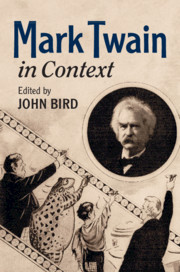Book contents
- Mark Twain in Context
- Mark Twain in Context
- Copyright page
- Contents
- Figures
- Contributors
- Preface
- Acknowledgments
- Chronology
- Abbreviations
- Part I Life
- Part II Literary Contexts
- Part III Historical and Cultural Contexts
- Chapter 15 Politics
- Chapter 16 Business and Economics
- Chapter 17 Religion
- Chapter 18 Science and Technology
- Chapter 19 Race and Ethnicity
- Chapter 20 Race and Ethnicity
- Chapter 21 Race and Ethnicity
- Chapter 22 Cosmopolitanism
- Chapter 23 Gender Issues
- Chapter 24 Gender Issues
- Chapter 25 History
- Chapter 26 Animals and Animal Rights
- Chapter 27 Nationalism and Anti-Imperialism
- Chapter 28 Philosophy
- Part IV Reception and Criticism
- Part V Historical, Creative, and Cultural Legacies
- Further Reading
- Index
- References
Chapter 19 - Race and Ethnicity
African Americans
from Part III - Historical and Cultural Contexts
Published online by Cambridge University Press: 12 December 2019
- Mark Twain in Context
- Mark Twain in Context
- Copyright page
- Contents
- Figures
- Contributors
- Preface
- Acknowledgments
- Chronology
- Abbreviations
- Part I Life
- Part II Literary Contexts
- Part III Historical and Cultural Contexts
- Chapter 15 Politics
- Chapter 16 Business and Economics
- Chapter 17 Religion
- Chapter 18 Science and Technology
- Chapter 19 Race and Ethnicity
- Chapter 20 Race and Ethnicity
- Chapter 21 Race and Ethnicity
- Chapter 22 Cosmopolitanism
- Chapter 23 Gender Issues
- Chapter 24 Gender Issues
- Chapter 25 History
- Chapter 26 Animals and Animal Rights
- Chapter 27 Nationalism and Anti-Imperialism
- Chapter 28 Philosophy
- Part IV Reception and Criticism
- Part V Historical, Creative, and Cultural Legacies
- Further Reading
- Index
- References
Summary
Mark Twain mirrored the complex racial changes of the American nineteenth century. His father owned a few slaves, and he grew up in a slaveholding community, with slavery seen as an accepted practice, endorsed by the government and the church. His exposure to the slaves on his Uncle Quarles’s farm in Florida, Missouri, had a lifelong effect on him and on his work. In his young life, he wrote some letters that show the racist attitudes he was exposed to in the pre-Civil War south, but as he matured, his racism gave way to empathy and understanding of the black experience. His 1874 short story “A True Story” began his use of black vernacular voices in his fiction, culminating in antislavery novels like Adventures of Huckleberry Finn and Puddn’head Wilson. In his private life, he secretly paid a black man’s tuition to Yale Law School, as well as other charitable acts. He was a friend and supporter of Frederick Douglass as well as Booker T. Washington and other black figures.
- Type
- Chapter
- Information
- Mark Twain in Context , pp. 192 - 202Publisher: Cambridge University PressPrint publication year: 2020

